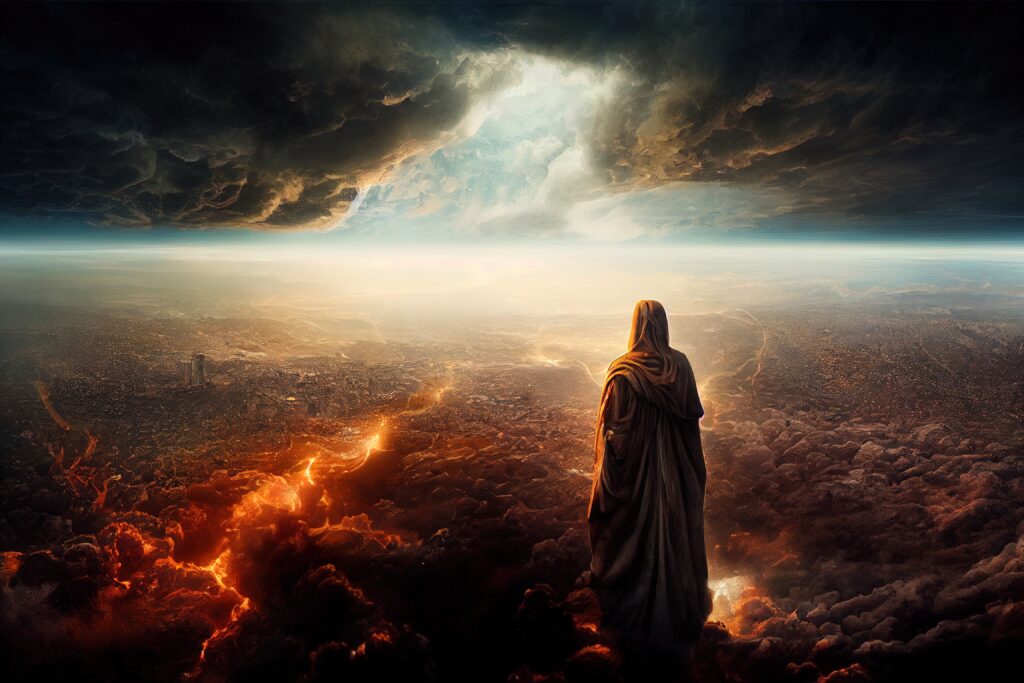
The Black Horse of Famine.
When the Lamb broke the third seal, I heard the third living being say, “Come!” I looked up and saw a black horse, and its rider was holding a pair of scales in his hand. 6 And I heard a voice from among the four living beings say, “A loaf of wheat bread or three loaves of barley will cost a day’s pay. And don’t waste the olive oil and wine.” – Revelation 6:5-6. NLT
Red is the colour of blood. The previous rider (v4) had a great sword and is allowed to take peace from the earth, which opens the way for people to kill one another (Matt. 24:6). The second seal describes the consequences of rejecting the gospel, beginning in the second century. As Christ is waging spiritual warfare through the preaching of the gospel, the forces of evil render strong resistance. Inevitably, persecution follows. The rider does not do the killing. Instead, the preaching of the gospel takes peace from the earth. As a result, persecution inevitably follows. (Notice what Jesus said about this in Matthew 10:34.)
The rider on the black horse holds a scale for weighing food. An announcement is made: “ ‘A quart of wheat for a denarius, and three quarts of barley for a denarius’ ” (Rev. 6:6, NASB). In that part of the world, grain, oil, and wine were the necessities of life (Deut. 11:14). To eat bread by carefully weighing the grain denoted great scarcity or famine (Lev. 26:26, Ezek. 4:16). In John’s Day, a denarius was a daily wage (Matt. 20:2). In normal circumstances, a daily wage would buy all the necessities for the family for that day. However, a famine would enormously inflate the normal price of food. In the scene of the third seal, it would take a whole day’s work to buy just enough food for only one person. To feed a small family, a day’s wage would be used to buy three quarts of barley, a cheaper, coarser food for the poor, so the prices mentioned in this text represent a severe famine. A man would have to work all day to get enough wheat to feed himself. If he had a family to support, he would need to buy the cheaper barley. Given the large size of families in those days, the children would likely die or be stunted by malnutrition.
The scene of the third seal points to the further consequences of rejecting the gospel, beginning in the fourth century, as the church gained political power. If the white horse represents the preaching of the gospel, the black horse denotes the absence of the gospel and the reliance on human traditions.
Grain in the Bible symbolizes the Word of God (Luke 8:11). The rejection of the gospel inevitably results in a famine of the Word of God like the one prophesied by Amos (Amos 8:11–13).
Why does the text mention sparing the oil and the wine, which are less necessary for life than grain? In Asia Minor of the 90s this text would have connected with a hot issue. Wine trade at that time was more profitable than grain. The wealthy landowners of Asia were, therefore, switching production from grain to grapes.
So much of the land in the Province of Asia (which included the seven churches) was dedicated to producing olive oil and wine for profitable export. Meanwhile, the cities of Asia had to import grain all the way from Egypt or the areas by the Black Sea. So, while landowners and shippers profited from their choice, the people in Asia had to pay higher prices for staple foods.
The problem was serious enough that the Emperor Domitian tried to intervene and force the landowners to restrict vine production in places like the province of Asia. His attempts were very unpopular and proved unsuccessful. If he had succeeded it would have been quite a blow to the wealthy of Philadelphia, for example, whose wealth was gained from wine production. As is often the case, the greed of the wealthy had serious consequences for the poor.
But the sparing of the oil and the wine could also be read as a token of God’s mercy in the time of judgment. Ancient Mediterranean warfare included destroying the standing crops in the fields, but not the vines and the olives trees (which take about 17 years to reach productive capacity). Destroying wheat and barley meant hardship for a year, but destroying vines and trees would result in enduring disaster.
While the judgments of God in our lives can be severe, they are for the purpose of redeeming us, not destroying us. It is not God’s purpose to prolong suffering, but to use difficulties to get our attention and bring us to a place that would be better for us. If everyone was more attentive to God’s call much of the injustice in the world would also disappear.

May the Lord keep drawing me closer to Jesus through the holy Spirit God bless our day happy Sabbath to you and your family